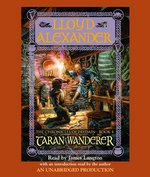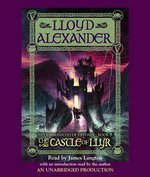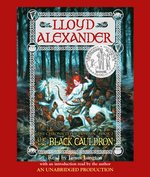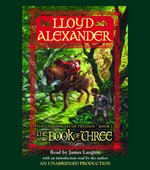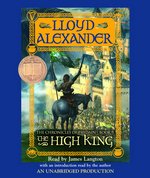 The High King
The High King
by Lloyd Alexander, James Langton (Narrator)
Series: Chronicles of Prydain, #5
Unabridged Audiobook, 7 hrs, 24 min.
Listening Library, 2005
Read: March 29 – 30, 2017

Arawn-Death-Lord has managed to get his hands on Dyrnwyn, Gwydion’s sword, which has emboldened him to move his forces to launch an all-out assault on the Kingdom of Prydain. Gwydion and his allies move quickly to assemble the forces necessary to stand against him — basically, it’s an Armageddon-type situation, and all hands are needed.
Taran is sent to the Free Commots, where he spent so much time recently to gather their support — and he does so, almost without trying to, becomes the leader of the assembled forces (such as they are) of the rather libertarian people. Before you know it, Taran’s leading his band into battle at the side of Gwydion and the other warleaders. It’s a stretch to believe, but at this point, you go with it. The forces marshaled against the High King are strong enough to make this an uphill battle, but when treason rears its ugly head and the forces of Prydain are divided against themselves, it really seems that all hope is lost. Eventually, Gwydion and his forces head off on a last-ditch effort to stop the Death Lord, while Taran, his companions, allies, followers and Glew take on a vital, but smaller task that will allow Gwydion’s hail Mary to work.
And frankly, that whole treason storyline bugs me — not just because it’s evil, but because it’s futile, stupid, and pointless. I think this was Alexander’s biggest error in the series. It serves no real purpose but to stack the odds against the armies of Prydain.
Finally, we get final battles — The Death Lord and his forces are defeated (spoiler, children’s fantasy written in the 60’s features good guys winning); the future of Prydain is settled; other Tolkien-esque things take place as is fitting in the conclusion to a fantasy series (actually, Tolkien was probably following the same older rules and tropes as Alexander, but we now associate them with Tolkien, not his predecessors).
Taran finally grows up into what Alexander’s been holdig out for him all along — it takes the whole novel, but it happens. Gwydion is probably the least interesting he’s ever been here, which is a shame. Eilonwy? Oh, Eilonwy — she’s just so perfect (as a character, probably annoying in real life — still, someone you want in your corner). I loved everything about her in this book. I wish Gurgi had a little more to do, and that Glew had far, far less. Fflewddur Fflam remains the unsung hero of this series — the sacrifices he makes, the efforts he makes, his wisdom, etc., are all overshadowed by his comedic use. What he goes through moved me more this time through than any of the deaths. As an aside, the first time I saw a picture of Lloyd Alexander, I shouted — Fflewddur! I don’t know if it was intentional, or if I just had a strange imagination, but he looks exactly like a Fflam.
Oh, and there are many, many deaths — mostly nameless soldiers on both sides, but there are quite a few named people, too. Some get great heroic moments, others are just named in a list of the fallen. I remember the first time I read this book being very upset by just one of them — it was quite possibly the first time in my young life that anyone other than a dog, an ailing elderly person or a villain had died in a book I read. I still get sad when I read that particular one, but it doesn’t get to me as much.
James Langton’s performance here is consistent with what he’s done for the last few books. If you liked him before, you’ll like him now. If not . . .
I remember liking this more than I did, even just a few years ago when I read this with my kids. Still, a great way to wrap up this series — Alexander ties up everything that needs tiring up, he rewards all the surviving characters in a fitting way and sends our heroes off on new adventures. There’s still a bit of fun, a little adventure, and character growth throughout, with all things ending up just where they need to satisfy readers. It’s really easy for adult-me to see where kid-me fell in love with the genre thanks to this series. Still, a fitting conclusion to this series — which I still recommend for young and old (primarily the young).
—–



